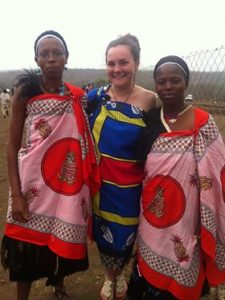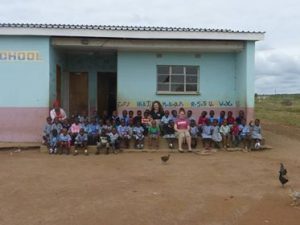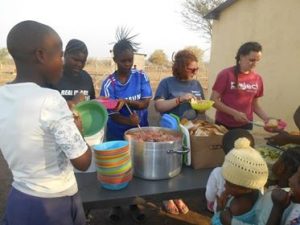My journey since volunteering with Project Trust by Anna Fraine
This blog has been written by Anna Fraine, who is due to graduate in December with a MA in Humanitarianism and Conflict Response. The blog relates to her experience as a Project Trust volunteer, living and working in eSwatini for twelve months, and being the recipient of the HCRI Global Citizenship bursary, which funded her postgraduate studies.
In August 2014, I set off for eSwatini, (formally known as Swaziland) after ten months of fundraising during my A level studies and two residential courses on the Isle of Coll, where Project Trust are based. My project in eSwatini was to run a community pre-school and soup kitchen, both of which had no running water or electricity, due to being located in two rural areas. The first five weeks tested my normally-confident personality where home-sickness, limited experience of pre-school teaching, and a lack of the siSwati language, presented me with the biggest challenge I had faced. Soon enough, however, I found myself feeling extremely privileged to have the opportunity for the experience and was excited about the goals I was starting to set myself, such as finding ways to work with the local community and make developments at the pre-school and soup kitchen.
Over the course of the twelve months, my project partner, Kate, and I worked on a number of initiatives. We worked with the local MP to have a fence and gate fitted around the preschool and to install a water tank and tyre garden. The fitting saved time for both of us, when considering we previously struggled to stop chickens coming through the broken window and into the classrooms. We also set up and registered the school curriculum with the government. Through our families, friends and churches back at home, we were also able to raise funding for a lady from the local community to go to college and undertake a pre-school teaching certificate. This was an integral step for the lady to support her children. At the end of the volunteering experience, I was pleased to have been awarded with the ONE Awards qualification – ‘Diploma in International Volunteering’. On reflection, the oversees volunteering experience allowed me to gain confidence and develop skills. It led to greater self-awareness and the notion of me as a ‘global citizen,’ wanting to learn and take action on the world’s humanitarian challenges.
After the experience, I commenced my undergraduate degree in English and History from the University of York. By the end of my studies, I had become aware of the Global Citizenship bursary, provided by HCRI for postgraduate studies. I visited the institute and discussed with academics how my volunteering year with Project Trust could be used to strengthen my UCAS application. In due course, I was delighted to be accepted onto the MA Humanitarianism and Conflict Response programme, with bursary funding.
On arrival at HCRI, I was pleasantly surprised to learn I was not the only Project Trust Return Volunteer to be accepted onto the programme. I soon found myself sharing details of experiences and projects with fellow Project Trust alumni. The MA programme in particular has enabled me to reflect, debate and listen to my classmates, which has been enriching due to the diversity of their backgrounds and experiences. What’s more, through discussing theories and case studies in lectures, I have explored the root causes of humanitarian challenges we face as a global community through an interdisciplinary approach. My volunteering experience with Project Trust has enabled me to contribute to class discussions and critique humanitarian issues, despite possessing limited work experience due to being younger in years compared to class mates. For instance, I applied my experience of working with women in eSwantini who were HIV positive and survivors of abuse, when exploring the structural violence against women in Latin America in the course unit, ‘Anthropology of Life-Course in Societies Affected by Violence’. What’s more, having seen the legacies of colonialism in eSwatini, I have further explored how an unequal global system persists through the course unit, ‘History of Humanitarian Aid’.
A key highlight from the MA programme has been to visit Uganda for a research field trip, when undertaking the optional course unit, ‘Humanitarianism and displacement: Researching the legacies of war’. During the trip, I engaged with NGO workers and their beneficiaries, as well as staff from the Office of the Prime Minister. Through engagement I gained insight into how the humanitarian system operates in a refugee and displaced persons context. Other highlights from my time at HCRI, have included my role as a postgraduate lead for the, ‘Young People in Humanitarianism Conference’, in which I organised logistics and delivered a series of workshops on Human Rights, Refugees, Disasters and Climate Change to local high school students. The latter workshop relates to the dissertation component of the MA programme, which I value undertaking as I have been able to conduct research relating to the environment and climate change which is an area of personal interest. Now that my dissertation is complete, I am due to start my role as a Research Assistant in the Department of Social Justice in the Catholic Bishops’ Conference of England and Wales based in London, where I intend to make a difference and work for peace through focusing on social justice issues in a UK context.
On reflection, my experience as a Project Trust Return Volunteer enabled me to study at HCRI and boosted my learning experience. In turn, HCRI has strengthened my professional merit to secure employment. I am extremely grateful to HCRI and Project Trust for providing me with enriching experiences and supporting me through my journey. I am a proud alumni of both organisations.





0 Comments